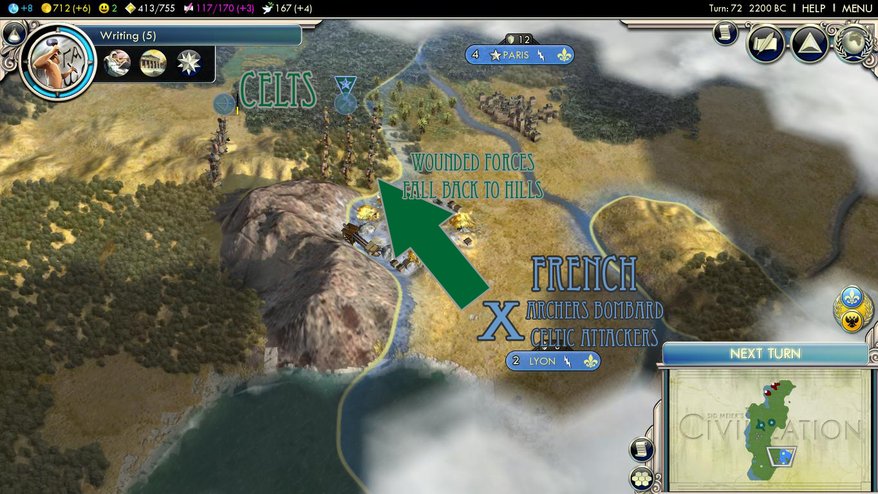
Time for a tactical withdrawal
2375 B.C.: The Celtic calendar is formalized to count the time between glorious battles.
Calendar tech lets me start building Stonehenge at my capital. Now I turn my tech path toward Philosophy, which will take me into the Classical Era and further cement my religious lead.
2250 B.C.: A German embassy, the first of its kind, is established in Edinburgh.
This lets the Germans see where my capital is, but also strengthens our friendship and lets us make Open Borders agreements and Defensive Pacts. It's a new feature in Gods & Kings, and I'm interested to see its effects on diplomacy.
2225 B.C.: After raiding the seemingly lightly-defended French town of Lyon, Celtic forces are surprised by French archers and forced to retreat into the nearby hills. This marks the first Celtic military defeat in history.
Lyon looked like a soft target, but even one unit of archers stationed in a city--which can't be attacked directly as long as the city holds--is enough to deter a much larger ground army. The mountains to the west of Lyon also ensure that all of my units have to pass within bombardment range of Lyon and Paris to attack it, so I think I'll just focus on Paris from now on.
Later that year, the Russians and the French make peace, leaving the Celts to fight the war on their own.
Keep up to date with the most important stories and the best deals, as picked by the PC Gamer team.
This is a pretty discouraging turning point. I'm still friends with Russia, but they seem disinterested in helping my fight the war that they freaking started in the first place. My armies are far from Celtic soil, and I can't expect any Russian help from the south. I could withdraw now and spend the next dozen turns farming barbarians, but I've decided to commit to seeing Paris burn.
Len Hafer is a freelancer and lifelong PC gamer with a specialty in strategy, RPGs, horror, and survival games. A chance encounter with Warcraft 2: Tides of Darkness changed her life forever. Today, her favorites include the grand strategy games from Paradox Interactive like Crusader Kings and Europa Universalis, and thought-provoking, story-rich RPGs like Persona 5 and Disco Elysium. She also loves history, hiking in the mountains of Colorado, and heavy metal music.

